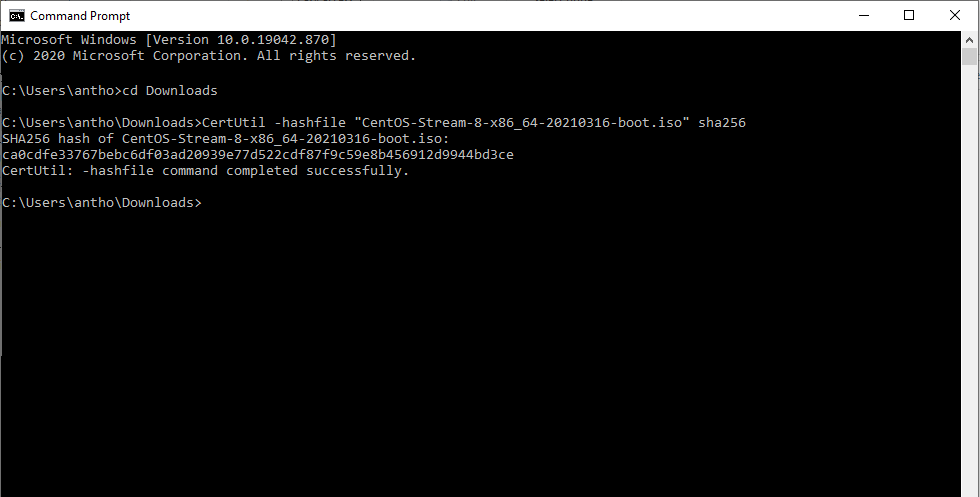

- #DUPLICACY HASH COMMANDLINE HOW TO#
- #DUPLICACY HASH COMMANDLINE INSTALL#
- #DUPLICACY HASH COMMANDLINE FREE#
To run rdfind on a directory simply type rdfind and the target directory.
#DUPLICACY HASH COMMANDLINE INSTALL#
$ sudo yum install epel-release & $ sudo yum install rdfind To install rdfind in Linux, use the following command as per your Linux distribution. The last rule is used particularly when two files are found in the same directory.
#DUPLICACY HASH COMMANDLINE FREE#
It is a free tool used to find duplicate files across or within multiple directories. If you are using a new tool, first try it in a test directory where deleting files will not be a problem.
#DUPLICACY HASH COMMANDLINE HOW TO#
In this tutorial, you are going to learn how to find and delete duplicate files in Linux using rdfind and fdupes command-line tools, as well as using GUI tools called DupeGuru and FSlint.Ī note of caution – always be careful what you delete on your system as this may lead to unwanted data loss. This may cause your directories to become cluttered with all kinds of useless duplicated stuff.

Often you may find you have downloaded the same mp3, pdf, epub (and all kind of other file extensions) and copied it to different directories. The string sh is a dummy argument and could be any single word (some seem to prefer _ or sh-find).Organizing your home directory or even system can be particularly hard if you have the habit of downloading all kinds of stuff from the internet. This is why we insert the string sh as the first argument after the end of the actual script. When invoking sh -c '.some script.' with arguments following, the arguments will be available to the script in except for the first argument, which will be placed in $0 (this is the "command name" that you may spot in e.g. The utility invoked by xargs is sh with a script given on the command line as a string using its -c flag. Xargs -0 will read the \0-delimited list of pathnames and will execute the given utility repeatedly with chunks of these, ensuring that the utility is executed with just enough arguments to not cause the shell to complain about a too long argument list, until there is no more input from find.

This is a character that is not valid in a Unix path and it enables us to process pathnames even if they contain newline characters (or other weird things). print0 will ensure that all found pathnames are outputted with a \0 ( nul) character as delimiter. If only the current directory is to be searched, one may add -maxdepth 1 after the. type f -name '*.words' will simply generate a list of pathnames from the current directory (or below) where each pathnames is that of a regular file ( -type f) and that has a filename component at the end that matches *.words. This matters since the last chunk of filenames sent to grep from find may actually only contain a single filename, in which case grep would not mention it in its results.īonus material: Dissecting the find+ xargs+ sh command: find. The last variation uses the fact that grep will include the name of the matching file if more than one file is given on the command line. The first variation uses grep -H to always output matching filenames.

To be sure that filenames are always included in the output from grep. Sort -o tmpfile -m tmpfile -o tmpfile -m sh + Sort -o tmpfile -m tmpfile -o tmpfile -m shĪlternatively, creating tmpfile without xargs: rm -f tmpfileįind. This means that in the general case (this will also work with many more than just 30000 files), one has to "chunk" the sorting: rm -f tmpfile Even Linux will complain about this if the number of files are much larger. On some Unix systems, 30000 file names will expand to a string that is too long to pass to a single utility (meaning sort -m *.words will fail with Argument list too long, which it does on my OpenBSD system). It will print the file name and the line to the terminal. grep will also require that the whole line matches perfectly from start to finish ( -x). This will instruct grep to treat the lines in dupes.txt ( -f dupes.txt) as fixed string patterns ( -F). To find what files these lines came from, you may then do grep -Fx -f dupes.txt *.words To get the duplicated lines written to the file dupes.txt. On some Unix systems (to my knowledge only Linux), it may be enough to do sort -m *.words | uniq -d >dupes.txt Since all input files are already sorted, we may bypass the actual sorting step and just use sort -m for merging the files together.


 0 kommentar(er)
0 kommentar(er)
